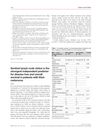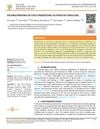 1 citations,
March 2019 in “Lasers in Surgery and Medicine”
1 citations,
March 2019 in “Lasers in Surgery and Medicine” The conference reported improvements in muscle volume, skin cancer diagnosis, facial and vaginal rejuvenation, and hair growth using various laser treatments.
 1 citations,
January 2017 in “Clinical approaches and procedures in cosmetic dermatology”
1 citations,
January 2017 in “Clinical approaches and procedures in cosmetic dermatology” Hair can't be reliably repaired once damaged; prevention and proper product use are key to maintaining hair health.
[object Object]  1 citations,
July 2016 in “British Journal of Dermatology”
1 citations,
July 2016 in “British Journal of Dermatology” Men with a certain type of hair loss often use facial moisturizers, and a specific antibiotic treatment may help another hair condition.
 1 citations,
October 2013 in “Actas Dermo-Sifiliográficas”
1 citations,
October 2013 in “Actas Dermo-Sifiliográficas” Customized medications made through compounding can be beneficial for various skin conditions but require careful regulation and collaboration between doctors and pharmacists.
 1 citations,
January 2013 in “Springer eBooks”
1 citations,
January 2013 in “Springer eBooks” The document concludes that skin and nail changes can indicate various underlying health conditions.
 1 citations,
December 2012 in “Journal of the European Academy of Dermatology and Venereology”
1 citations,
December 2012 in “Journal of the European Academy of Dermatology and Venereology” The health of the sentinel lymph node is the best indicator of survival for patients with thick skin cancer.
 1 citations,
September 2011 in “Journal of Dermatology”
1 citations,
September 2011 in “Journal of Dermatology” A woman with a new PTCH gene mutation has both Gorlin syndrome and severe hair loss.
 1 citations,
October 2010 in “Cambridge University Press eBooks”
1 citations,
October 2010 in “Cambridge University Press eBooks” Hormonal therapies are effective for managing hair and skin symptoms in women with PCOS.
 1 citations,
January 2010 in “Elsevier eBooks”
1 citations,
January 2010 in “Elsevier eBooks” Any drug can cause skin reactions, but antibiotics, NSAIDs, and psychotropic drugs are more common, with some reactions being life-threatening.
 1 citations,
January 2006 in “Elsevier eBooks”
1 citations,
January 2006 in “Elsevier eBooks” The conclusion is that different types of hair loss in dogs and cats can be cosmetic or serious, and affected animals should not be bred.
 1 citations,
January 2006 in “Elsevier eBooks”
1 citations,
January 2006 in “Elsevier eBooks” Cats lose fur due to various reasons, including allergies, infections, genetics, hormones, diet, cancer, stress, and some conditions are treatable while others are not.
 1 citations,
March 2004 in “Journal of The European Academy of Dermatology and Venereology”
1 citations,
March 2004 in “Journal of The European Academy of Dermatology and Venereology” Hair loss improved with treatment and successful transplant.
 1 citations,
March 1954 in “Archives of dermatology”
1 citations,
March 1954 in “Archives of dermatology” Animal research has greatly advanced dermatology.
[object Object]  1 citations,
July 2022 in “Case reports in endocrinology”
1 citations,
July 2022 in “Case reports in endocrinology” A 70-year-old woman with a malignant adrenal tumor improved after surgery and radiotherapy.
 June 2024 in “International journal of nanomedicine”
June 2024 in “International journal of nanomedicine” Azelaic acid micro/nanocrystals, especially with ultrasound and salicylic acid, greatly improve acne treatment.
 April 2023 in “Clinical theriogenology”
April 2023 in “Clinical theriogenology” The dog's skin condition improved after removing a tumor that was causing hormone imbalances.
 September 2022 in “Dermatology and therapy”
September 2022 in “Dermatology and therapy” Contact immunotherapy might help treat various skin conditions, but more research is needed to confirm its safety and effectiveness.
 December 2021 in “International journal of research - granthaalayah”
December 2021 in “International journal of research - granthaalayah” A young woman had a rare, usually non-cancerous tumor on her face that was initially mistaken for a different condition.
 September 2021 in “International Journal of Biomedicine”
September 2021 in “International Journal of Biomedicine” Certain gene variations are linked to a higher risk of severe acne, suggesting a genetic influence on the condition.
 July 2021 in “Journal of dermatology research and therapy”
July 2021 in “Journal of dermatology research and therapy” Using combined treatments can help manage acne by targeting the bacteria and skin changes that cause it.
 March 2021 in “Mansoura Veterinary Medical Journal /Mansoura Veterinary Medical Journal”
March 2021 in “Mansoura Veterinary Medical Journal /Mansoura Veterinary Medical Journal” Ringworm is a common, contagious fungal infection in dogs that can spread to humans and requires lengthy treatment.
 October 2020 in “Veterinary Dermatology”
October 2020 in “Veterinary Dermatology” New treatments and diagnostic methods for various animal skin conditions showed promising results.
 November 2019 in “Harper's Textbook of Pediatric Dermatology”
November 2019 in “Harper's Textbook of Pediatric Dermatology” The document is a detailed medical reference on skin and genetic disorders.
 January 2019 in “Springer eBooks”
January 2019 in “Springer eBooks” Acne can appear or persist in adulthood due to hormonal changes, external factors, or substance use, and requires appropriate treatment.
 January 2019 in “ARC journal of pharmaceutical sciences”
January 2019 in “ARC journal of pharmaceutical sciences” Acne can be managed with various treatments and requires psychological support due to its emotional impact.
 January 2019 in “Medicine Science | International Medical Journal”
January 2019 in “Medicine Science | International Medical Journal” Children with different rheumatologic diseases have specific skin symptoms that can help with diagnosis.
 June 2018 in “Surgical Case Reports”
June 2018 in “Surgical Case Reports” S-1 treatment led to a complete response in pancreatic cancer with manageable side effects.

 January 2018 in “Springer eBooks”
January 2018 in “Springer eBooks” Athletes need effective management of skin disorders for their performance and well-being.
 January 2018 in “Springer eBooks”
January 2018 in “Springer eBooks” Hidradenitis Suppurativa is likely an autoinflammatory disease, and better understanding its causes could improve treatments.






























